|
Ralepozozaxe posted:While bartering with random goods is good fun, having a uniform currency in our lands would be very useful. We should start a Coin Minting Initiative, and the coins should have a horse on them. Hear hear! Gimme a mint!
|
|
|
|

|
| # ? May 3, 2024 23:51 |
|
As we have settled down and created a more functional state, we can no longer call upon the endless tribesman we used to. But that doesn't mean we should regress to a mere horde. Rather, let us bolster our numbers by raising a banner of civilization, that spears and bows will flock to us from far and wide! Let us lay down, for all and eternity, the Rights of Man. (I would say man over birth because our centralization seems to already bring in the research bonuses aplenty based on the above, whereas we could always use more dudes for murder)
|
|
|
|
Rody One Half posted:As we have settled down and created a more functional state, we can no longer call upon the endless tribesman we used to. But that doesn't mean we should regress to a mere horde. Rather, let us bolster our numbers by raising a banner of civilization, that spears and bows will flock to us from far and wide! Doesn't look like we can do that yet.
|
|
|
|
Ralepozozaxe posted:While bartering with random goods is good fun, having a uniform currency in our lands would be very useful. We should start a Coin Minting Initiative, and the coins should have a horse on them. I love money!
|
|
|
|
Minting coins is the traditional way to demonstrate that we have true power, not just temporary conquests.
|
|
|
|
Hmm. The Council of great clans having more authority is a good thing, but we must go further! The Minor Clans should also be more involved, both to help them achieve greatness and to be the thread to knit our conquests and society together. We must all have a stake in Scythia for it to last!
|
|
|
|
NewMars posted:Doesn't look like we can do that yet. Whoops! Yeah sure Coinage
|
|
|
|
The whole world will soon be using horsecoin
|
|
|
|
Our new coin will block the chains of those who would enslave us.
|
|
|
|
megane posted:The whole world will soon be using horsecoin
|
|
|
|
Since Imperator: Rome hasn't gotten the sort of LP coverage other paradox games have on this forum, I would love to have an overview post and an explanation of what differentiates it from other Paradox games. Edit: oh yeah, Horsecoin. It will add equinity. SirPhoebos fucked around with this message at 21:11 on Aug 25, 2022 |
|
|
|
This is good for horse coin
|
|
|
|
DALL-E "A ancient coin stamped with the image of a running horse" 
|
|
|
|
SirPhoebos posted:Since Imperator: Rome hasn't gotten the sort of LP coverage other paradox games have on this forum, I would love to have an overview post and an explanation of what differentiates it from other Paradox games. Yeah the only broadcast time it's gotten was that aborted Achaemenid lp
|
|
|
|
I:R has many problems, but they all come down to the same thing: it needs the kind of crazy support stellaris, crusader kings or europa universalis have gotten. It never got it and Paradox just quietly shuttered it, so... yeah.
|
|
|
|
A real shame because the game is beautiful and the era is ripe for the taking for these kinds of games.
|
|
|
|
I, for one, am very interested in the new fashion that is Adopting Human Sacrifice.
|
|
|
|
I could just never really feel the kind of narrative an EU or CK game had while playing Imperator, and I could never figure out why. Despite all the options for manipulating culture, class, families, etc. it just felt lifeless.
|
|
|
|
This horsecoin stuff sounds completely legit and 100% not a scam. I'm in.
|
|
|
|
4: The Triumvirate The reign of King Sangha was dominated by the growing influence of what would come to be known as the ‘Triumvirate’ of Galatia, Dacia and Scythia. A confluence of interests and a shared desire to supplant Hellenic hegemony over the eastern Mediterranean grew into a powerful tripartite partnership which sought each others’ assistance against shared foes. When the Lydian people rose up against their Celtic overlords, it was with the assistance of Scythian horsemen that their hopes for independence were dashed.  Indeed, the shared approval and endorsement of the other two powers (and the corresponding military support that came with it) was often level by or against claimants to the various thrones in question - and they were thrones, both Galatia and Dacia having transformed themselves into true Kingdoms by the time of the Triumvirate.  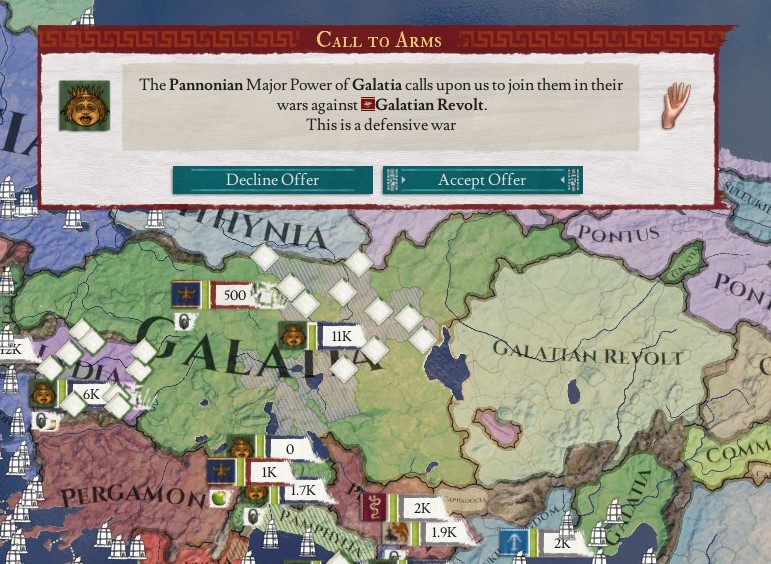 The value of the Triumvirate is that while each power may have struggled to resist an attack from any one of the regional powers found in Hellas and greater Galatia, together they were more than able to resist various failed attempts to roll back the growing strength of each of the constituent kingdoms.    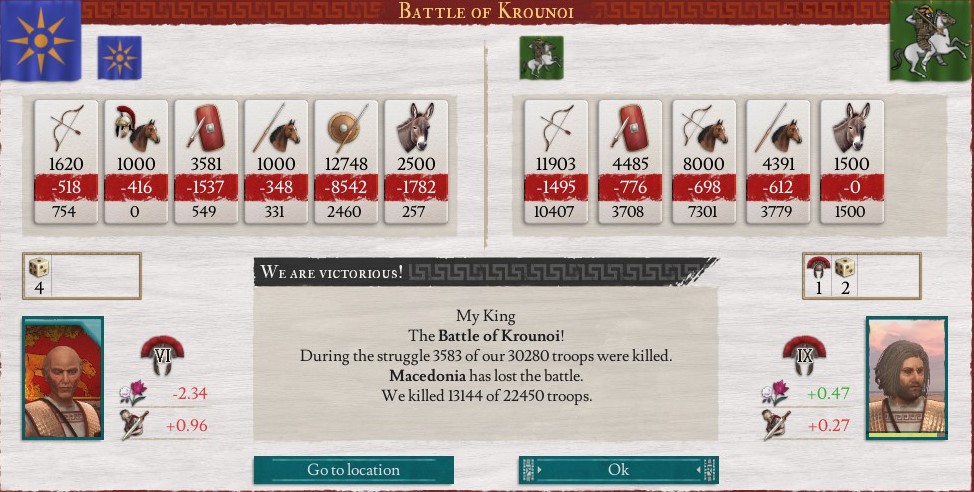   The temptation must be resisted by the historian to assume that the relations between the constituent elements of the Triumvirate were discrete and separate. While it had many elements of what would in modern days be considered an alliance, the terms of such agreements were far more moderated by in-person friendship and allegiance than modern inter-state relationships.  This was particularly true of the Scythians who, as a confederation of nomads, had the weakest state structure of the group. Power resided with the clan chiefs, and even when minting coins the king had to seek the approval of the chiefs. When troops were levied for war, chiefs often had to be directly bought off to ensure that they would follow with the main host rather than pillaging and looting on their own.  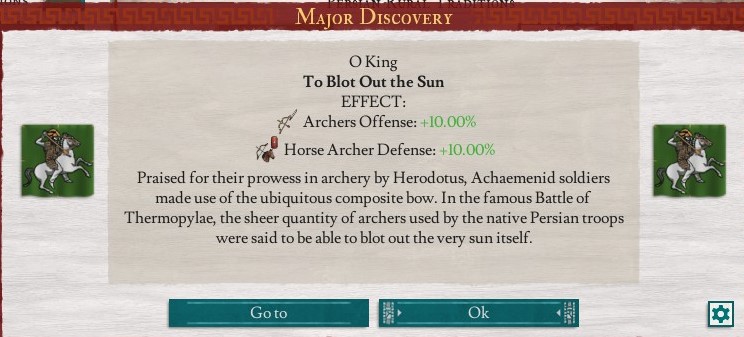  This attitude was best exemplified by the continued reference to King Sangha as King ‘of the Scythians’ as opposed to ‘of Scythia’, which was a form of address mirrored by foreign writers discussing the Scythian migration down the Istros. As more and more non-Scythian peoples came under the rule of Scythian elites, the pace of conquest began to strain the quite limited administrative capacity of the Scythian elite.  This was hardly a problem just for the Scythian chiefs, however - both Rome and Carthage had established dictatorships which, although nominally temporary, were more and more relied on as a permanent measure as southern Italia faced Punic subjugation. In the wild forests of the North, the Quadia tribe, which had attended some reasonable level of regional hegemony, significantly decentralized, offering many of their subject tribes autonomy and a chance for freedom. 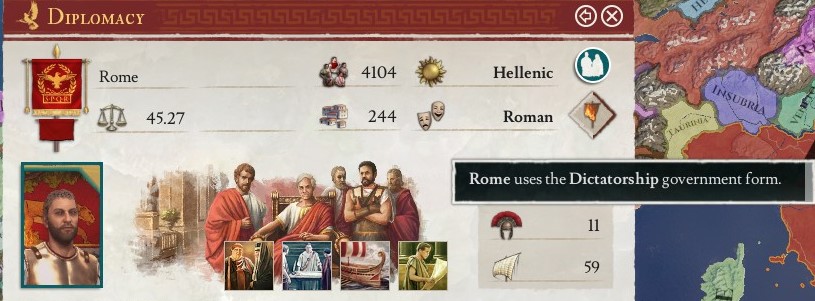  Sangha was unwilling to relinquish direct control, however, motivated firstly by his personal animosity against Spithri, the powerful magnate of Thrace, but also the continued threat posed by the hellenic kingdoms to the South. While the first factor was conveniently eliminated as an issue as the Taurician under the command of the king levies were putting down a revolt (which, in fairness, does appears to have been instigated by Spithri) in Thrace, the continued menace to the south was driving Sangha to greater degrees of centralization than had previously been known in Scythia. 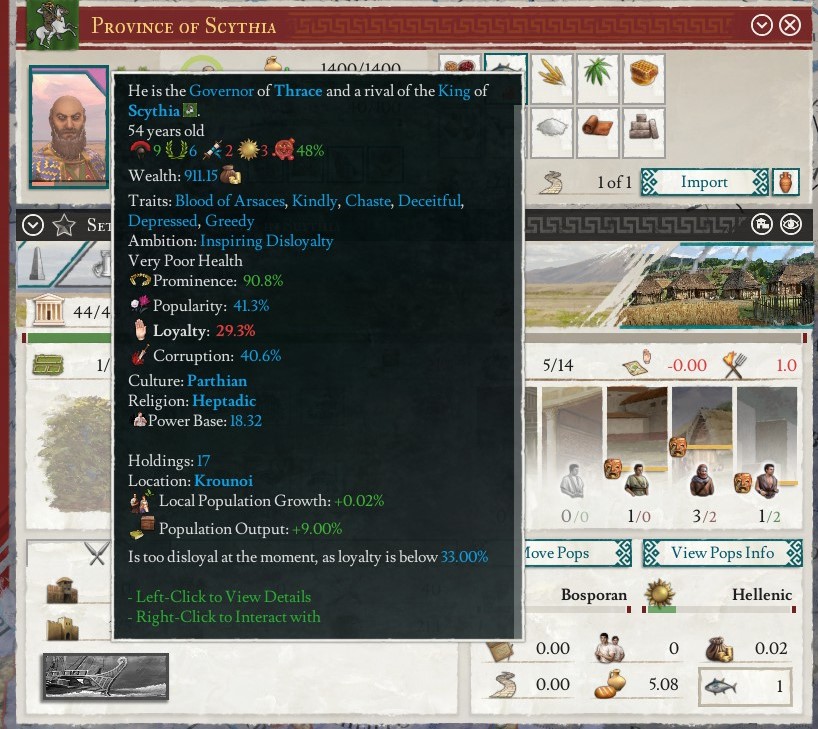 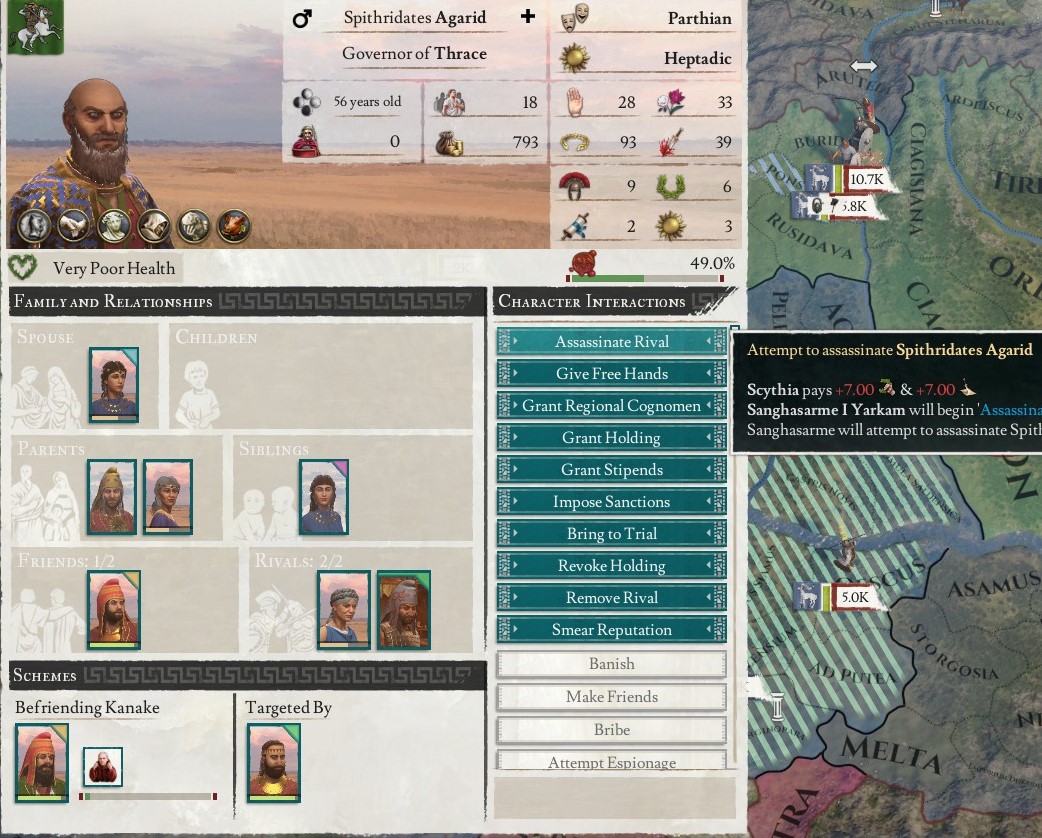 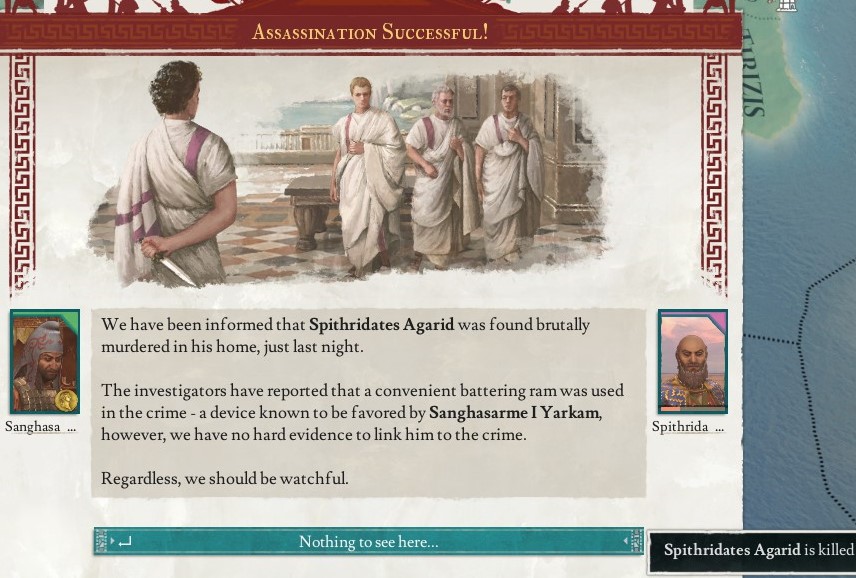 As taxes rose and non-Scythians found their lands being confiscated for distribution to Scythian tribesmen, the Scythian ‘state’ found itself teetering on the verge of widespread revolt. This sentiment was not shared by the great chiefs, however - all over the age of 60, they were convinced the Scythian people had never been stronger and saw no need for change. That was all the more true because the next few kings seemed sure to have short reigns - King Kalya lasted 13 months from being hailed king to his death, and was notoriously so feeble at the coronation who was unable to unsheathe his sword without assistance.   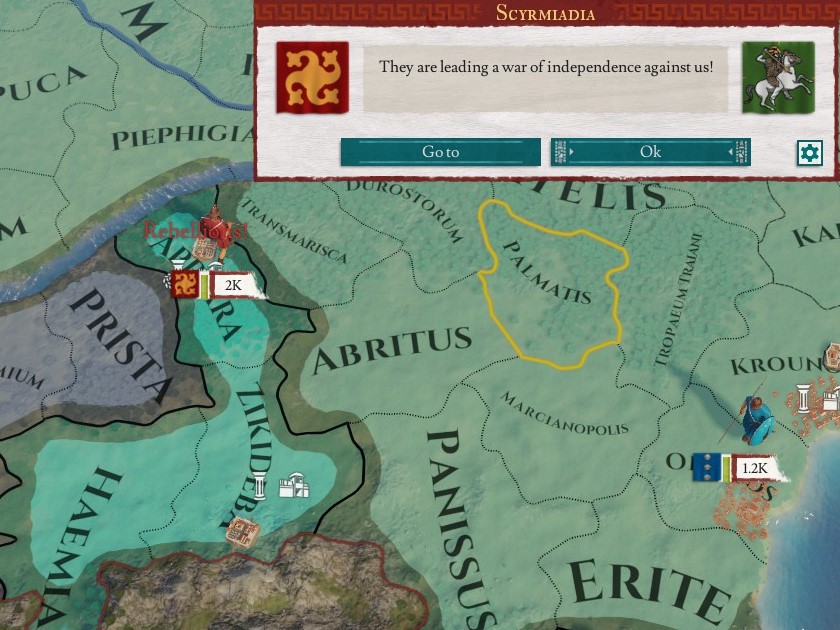 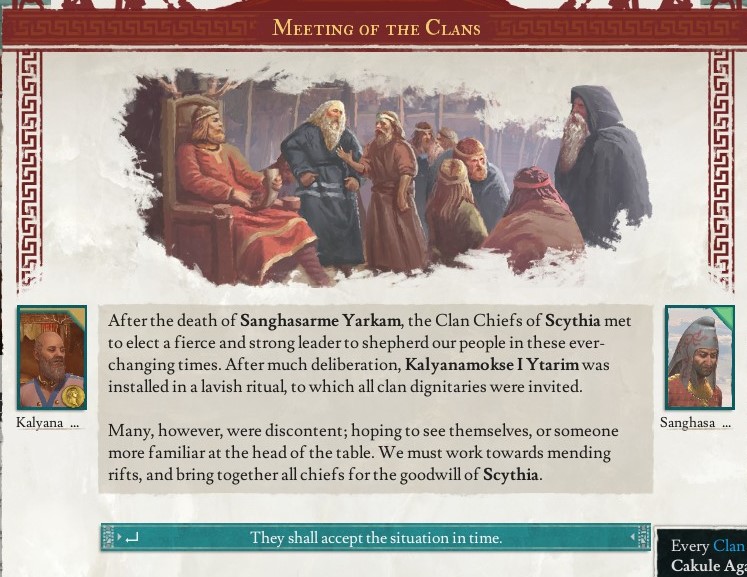  Also, the Indo-Greek Kingdom (separately: better names for this appreciated, because that’s extremely  [/img] 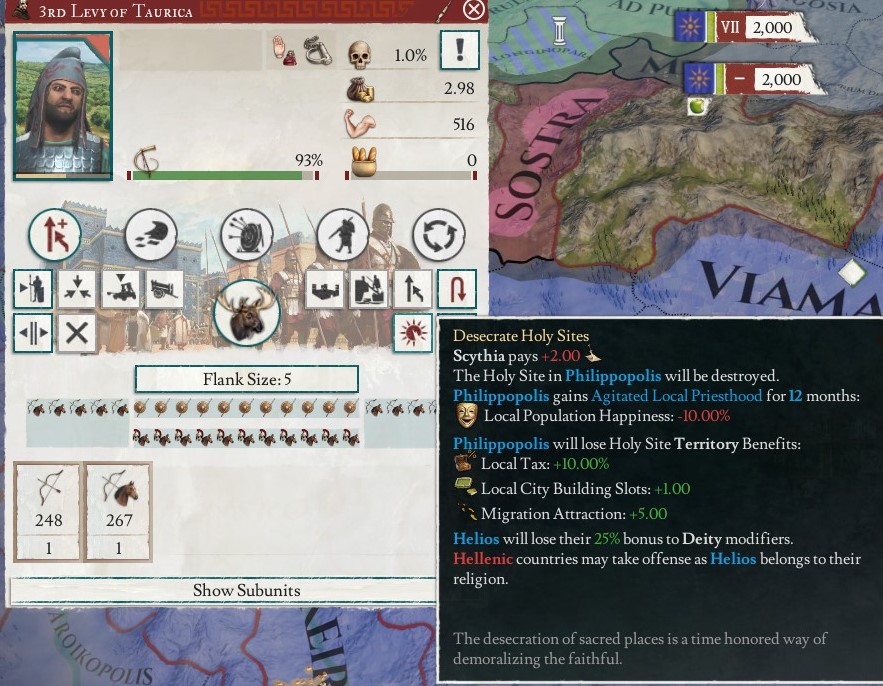 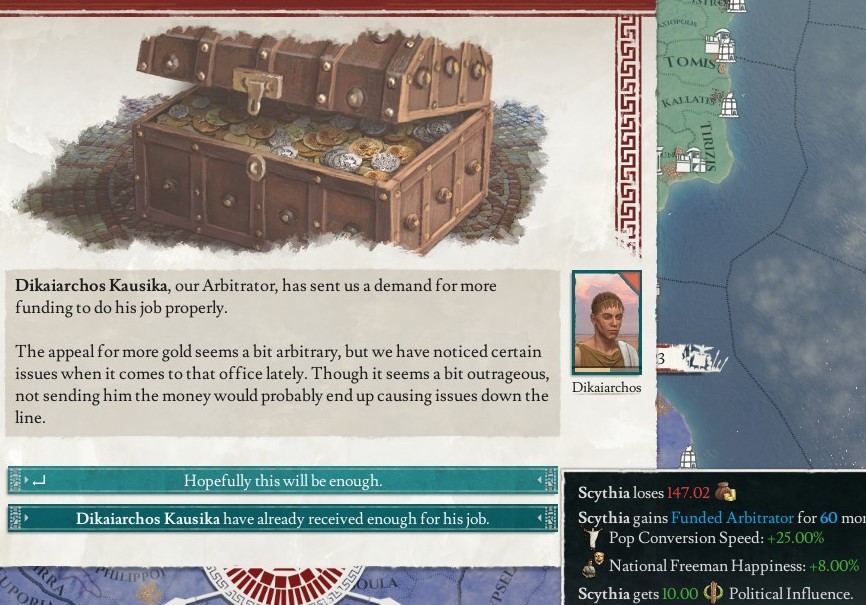   Europe, 25 years before… something? It’s an odd calendar we’re using, looking forward to clarifying what we’re counting down to: 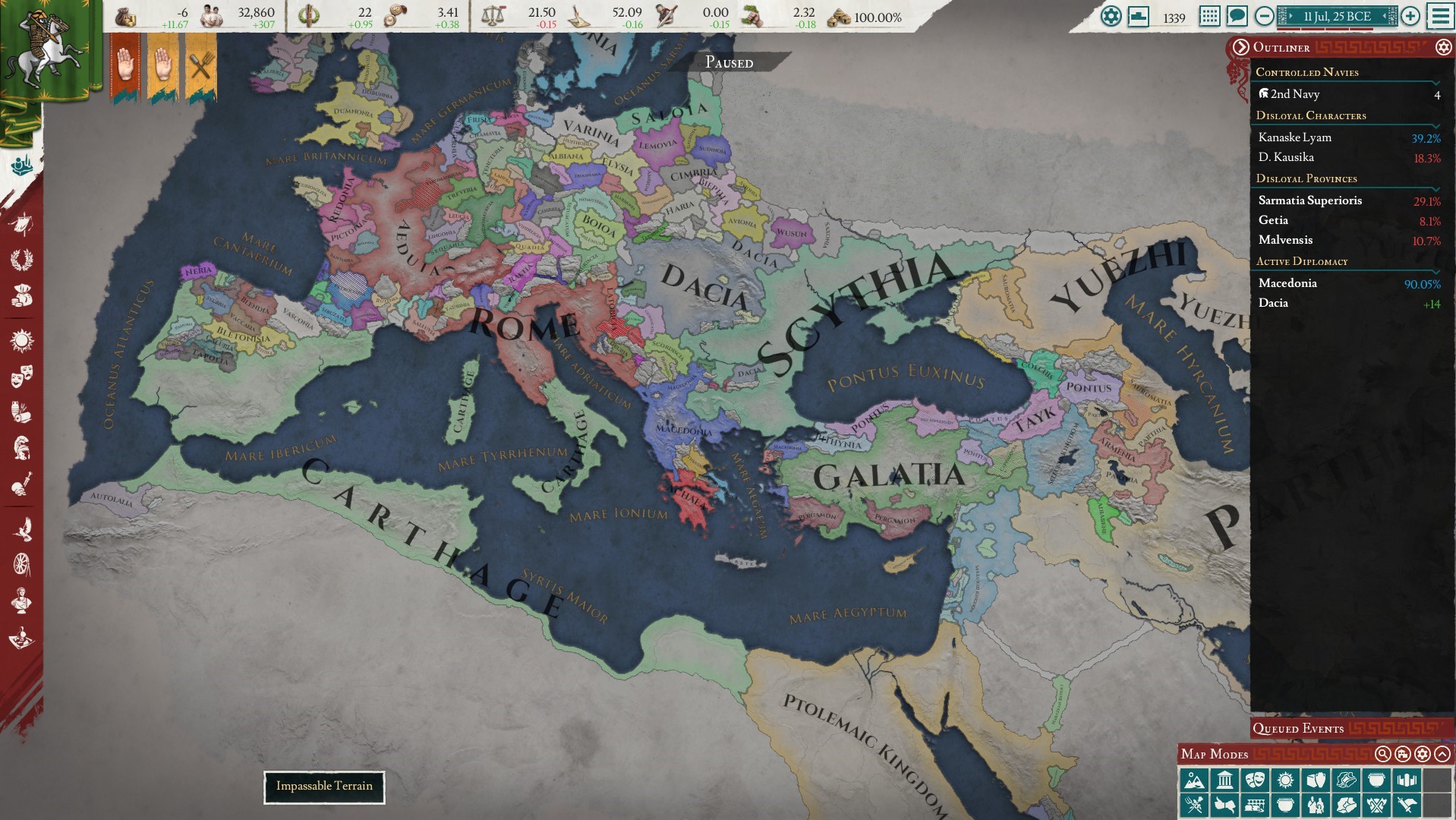 Asia: 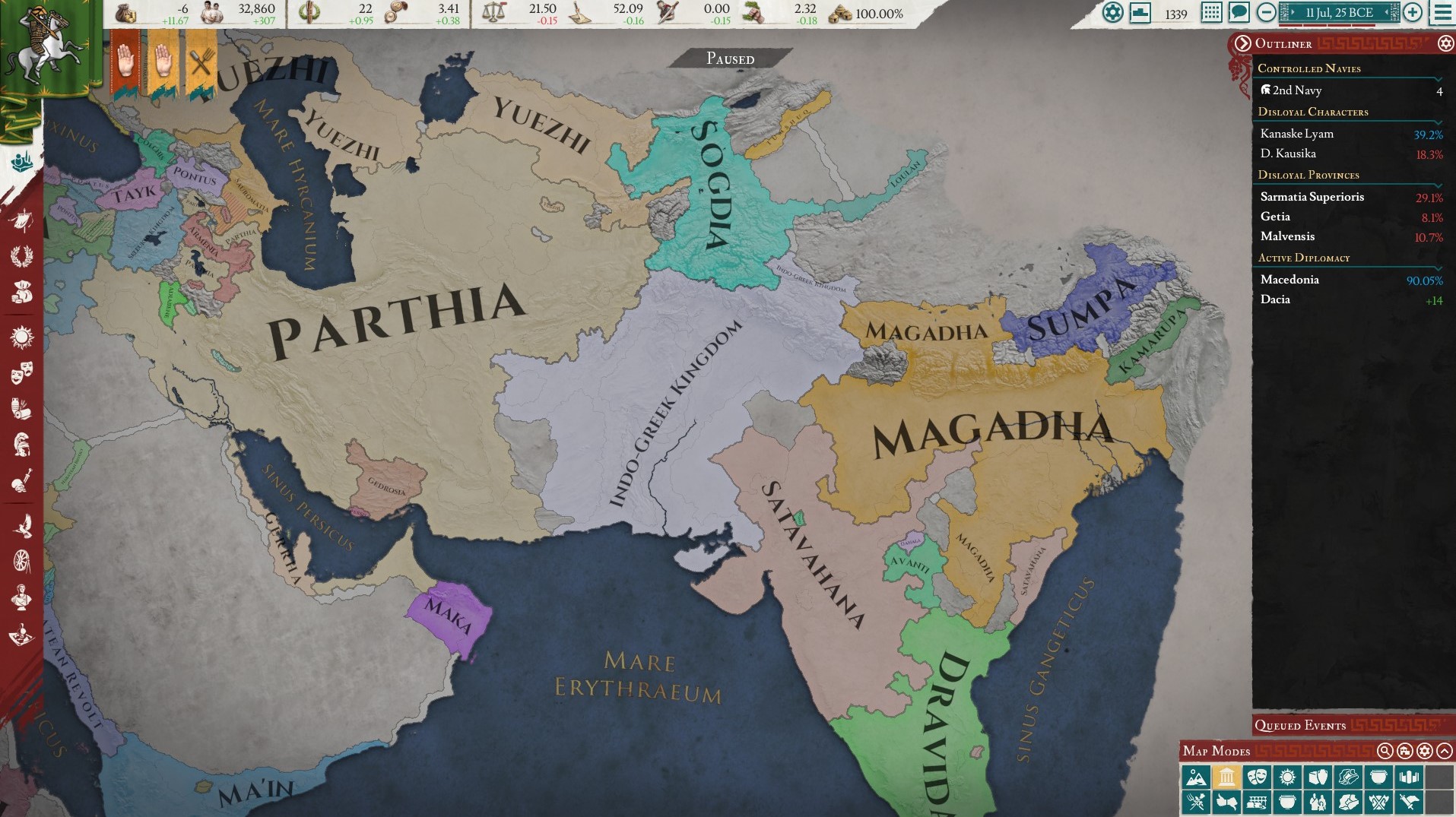
Yuiiut fucked around with this message at 08:28 on Sep 1, 2022 |
|
|
|
Yuiiut posted:
Maybe call it Bactria, if that isn't already in use elsewhere?
|
|
|
|
Who does an assassination with a battering ram?
|
|
|
|
Assassinations are really flavour of the month, you can get them done with an axe and a bear costume, forty men dipping their halberds in holy water, a mind controlled sniper or a boat rigged to sink with all hands, there's really no limit to how they happen.
|
|
|
|
Does Carthage have huge buffs or something how is this after the Second Punic War
|
|
|
|
Rody One Half posted:Does Carthage have huge buffs or something how is this after the Second Punic War Carthage got lucky with the scripted war against Numidia and Rome - the First Servile War triggered, tied up the Roman legions (I think it got the ai confused with priority), so Numidia got swallowed up by Carthage. Rome has been having serial civil wars - their Tyranny was crazy high when I tagged into them, so any disloyal general almost immediately causes a revolt. Carthage has pretty high AE but is managing to bleed it off, and any revolt seems to spawn in Iberia so can't threaten the homeland/powerbase, whereas Roman civil wars are over Italia.
|
|
|
|
Jossar posted:Maybe call it Bactria, if that isn't already in use elsewhere? the indo-greek kingdom isnt bactria, its this dudes joint https://en.wikipedia.org/wiki/Menander_I
|
|
|
|
That makes Euthydemid Empire the easy kinda-boring answer?
|
|
|
|
This seems to give an alternate name as being the Yavana Kindgom.
|
|
|
|
Technowolf posted:Yavana Kindgom. No thanks, I have plenty.
|
|
|
|
SirPhoebos posted:Since Imperator: Rome hasn't gotten the sort of LP coverage other paradox games have on this forum, I would love to have an overview post and an explanation of what differentiates it from other Paradox games. Overview of Imperator: Rome Note that my experience is somewhat limited - I only got into I:R after development had ceased, and am by no means an expert. Pops The core engine of a state is its pops. Pops have a religion and culture - we’ve been reasonably aggressively converting and assimilating our conquests. Pops have a class (Nobles/Citizens/Freemen/Tribesmen/Slaves), higher classes have more useful outputs (research/traderoutes) compared to lower classes (manpower/tax). However, higher classes consume more food and so require more management, and almost always only exist in cities. Each territory will have a ‘desired ratio’ of each class based on laws/research/buildings, and will promote/demote pops until it reaches the correct ratio. Notably, only pops with the correct culture(s) may promote to being a citizen or noble, but conquered pops will retain their status, so we have Macedonian nobles and citizens despite other Macedonian pops being banned from promotion to that level. Pops that are unhappy generate unrest, which is moderated by their political power (a angry slave is a tuesday, a angry noble is a problem). Each territory contributes its net unrest to the province's loyalty based on its percentage of the population. The map The map of I:R is very similar to CK3 and what we’ve seen so far from Vic 3 - individual territories are grouped together in provinces. Provinces form part of a region - all regions not in your capital region need a governor. Individual territories which are sieged down can be taken in war if you hate having pretty borders. Territories can be rural (the overwhelming majority will be this), cities (making up the bulk of the remainder), or metropoli (if they’ve got a truly huge number of pops - over 80). Rural territories can build a single building (or two, if you pick a certain research option), cities can have a scaling number of permitted buildings based on population, with some other ways to raise the number of permitted buildings for cities. Loyalty and food is tracked on the provincial level - if food reaches 0, bad things happen (unsurprisingly), if loyalty reaches 0 the province starts a revolt against you. Neighboring states can piggyback off such a revolt by allying the revolting province - the AI is reasonably good at trying to dogpile. During war, provinces that are sieged down lose population - around 2/3rds of that loss will be kidnapped and sent as slaves to the besieger’s homeland (some weighted allocation between different cities and provincial capitals). The rest die. The state States constitute the playable entities of I:R. They have a religion and culture (more on that in a moment) which they will automatically (sloooooowly) convert their subjects to. They have stability, war exhaustion, aggressive expansion, tyranny and political influence. Stability, aggressive expansion and war exhaustion provide scaling effects on pop happiness - our current situation is pretty bleak. You can improve stability via offering sacrifices - we currently lack the political power to do so, so are waiting it out and trying to not implode. States can be monarchies, republics, or tribes - we’re a tribe, so our rural territories have a higher desired ratio of tribesmen and a lower desired ratio of slaves - Scythians will never be slaves (offer only valid for 30% of Scythians. 50% of Scythians will still be slaves). Culture & Religion Religion is significantly easier to change than culture (provinces can have governorship policies set on them, the religion conversion one is 3 times more effective at speeding up the process than the culture one and the debuff to conversion speed from incorrect culture smaller than the debuff to assimilation from incorrect religion). All religions have a pantheon (even Judaism, which has it localized to be different prophets) with 4 deities - while you can worship other (polytheistic) gods, doing so significantly slows down conversion speed (I’ve actually flicked Galatia over to a all-druidic pantheon so we get more druids in Anatolia). Culture is more important, but harder to change. While you can give noble and citizen rights to non-primary cultures, doing so results in all integrated cultures having lower overall happiness. We’ve been building grand temples and great theaters in cities, which significantly speed up conversion and assimilation rates (though I imagine our ‘great theaters’ are hunting lodges. Drama? What are we, Greek?) Military Primary culture lands are generally unlikely to rebel, and allow you to raise more levies. Levies are raised on a regional basis, and scale off the number of integrated (so, for us, Scythian) culture pops in the region. Each culture raises a mix of a certain type of troops, regardless of where they are on the map - Scythians in Egypt would raise the same 10% Heavy Cav, 15% Light Cav, 30% Horse Archer and 45% Archer as we do, which is a little  but does help each culture feel distinct and different (provided you get a decent levy mix, the baltics are stuck with 65% of their troops being light infantry chaff). but does help each culture feel distinct and different (provided you get a decent levy mix, the baltics are stuck with 65% of their troops being light infantry chaff).There’s a lot that goes into a troops performance - discipline, tactics, morale, offense and defense. In truth, like most paradox games, I don’t 100% understand it but thankfully per paradox rules the bigger number wins (provided you let your troops rest up between engagements to recover morale), though the all-cavalry divisions typically arrive before the main host and get wiped if I don’t carefully micro. Military experience is generated when you stand your levies down, and your available trees are determined by your culture - I’ve just been buffing out our cavalry. Oh, and naval warfare technically exists! Moving on. Characters This is the jankiest and most ‘has a lot of promise’ portion of the game. You have characters who act as kings, generals, advisors and the like. Characters have personal wealth and loyalty, which is based on their powerbase, traits, relationship with your ruler and the like. Characters belong to families, who expect a certain number of positions in government and will be displeased if you don’t comply. Disloyal characters will act on their own accord - governors will refuse replacement and not let you alter governing policies, generals will run their armies as they see fit and so forth. The jank arrives because it’s often hard to get a feel for characters - on the one hand, it feels very accurate that I know nothing about the schmuck I’m shipping off to govern Sarmatia Asiatica in my name, but just know his uncle will stop trying to invade Macedon solo if I put him in charge there. On the other hand, I’m a tribe! Why are there governorships? If all the levies are automatically and irrevocably under the control of the heads of great houses when they’re raised, why do they only count towards their ‘powerbase’ when they are raised? I regularly go to raise troops, the chiefs are automatically put in charge of them, then the game recognises that they’re in charge of troops and spike their powerbase, making them disloyal and needing to be bribed before they will follow orders.
|
|
|
|
Always nice to see new megacampaigns, especially ones starting in Imperator, and especially ones featuring my favorite classical horse nomads.
|
|
|
|
5: The Star-Crazed King After the destructive war against Macedon, the realm was given time to rest and rebuild as a string of elderly kings took the throne. Instead of conquering new lands off the Greeks and adding more unruly nobles and slaves to the south, the Scythian host was instead dispatched to Galatia. Following a succession crisis, the Galatian realm was torn asunder by fraternal conflict, as the two sons of the king were unable to agree on who should rule.  As Galatia warred against itself, the realm of Pergamon to the south saw its opportunity to strike. With the assistance of the powerful Egyptian Kingdom, Pergamon annexed the southern coast of Galatia, leaving Celtic merchants with the unenviable choice of shipping from the harbors to the north of Antioch, and facing tolls and duties from passing by Cyprus, or using Pergamonnese harbors and paying the extortionate fees. In Egpyt, Scythia found a terrible foe - not only were the revenues and manpower of the Mediterranean’s breadbasket vast and seemingly inexhaustible, but the camels-riders which followed the Ptolemiac banner terrified the horses of the Scythian host, throwing them into confusion and barring victory in all but the most overwhelming situations. 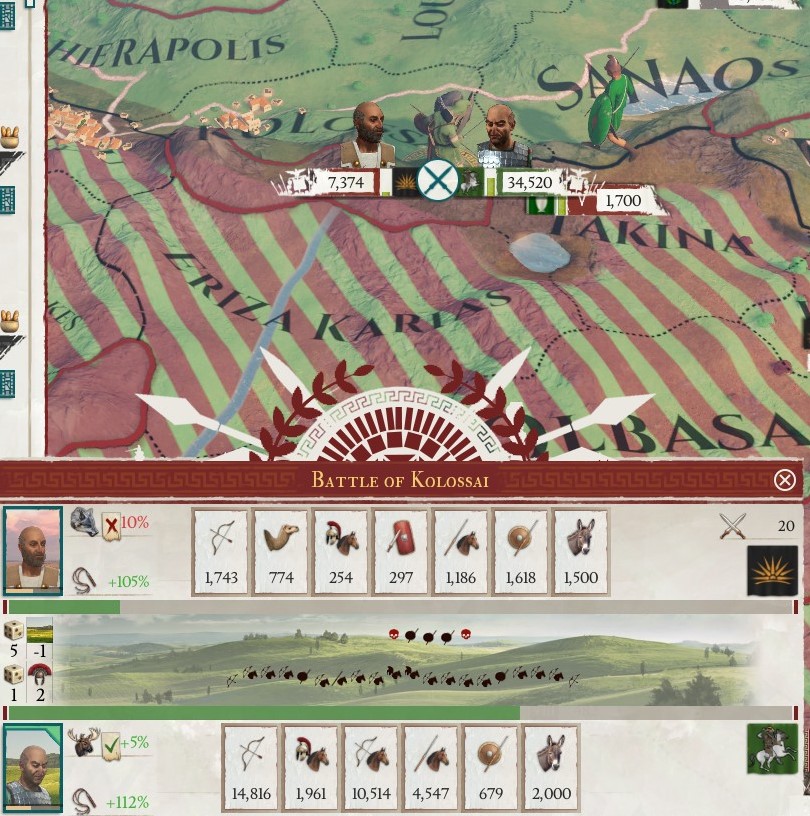 The desperate battles against Egyptian troops had given rise to a new generation of leaders. While immediately considered for kingship, Yonu, one of the warchiefs of the Scythian host, was famed not only as a commander of men but a seer of the stars. While there were many stars to scry, there was one on the minds of all learned men, one which outshone all the rest, relegating them to lesser spectators of its greater glory. Wise-men from all corners of the known world were in agreement - a new king, of the sort which had not been seen before, was to come into the world. 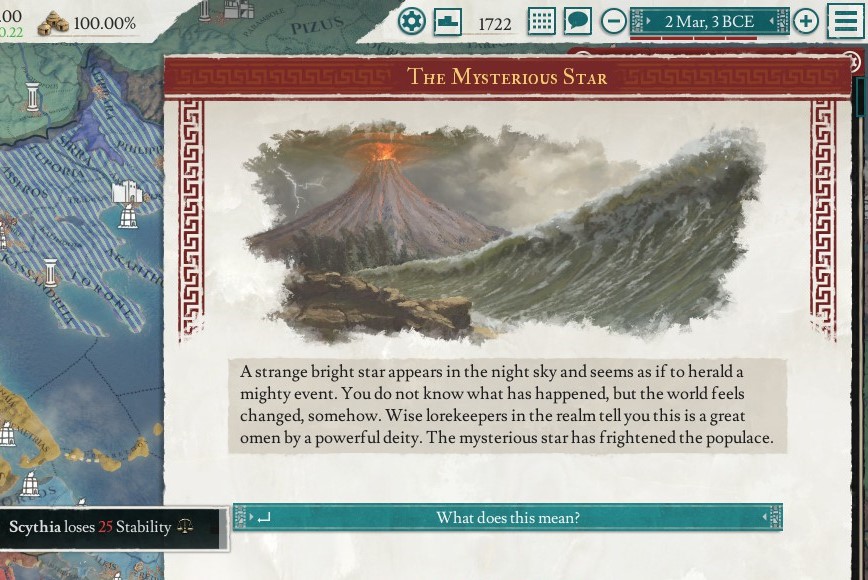 The star was not merely seen in Scythia and Hellas, but all the known world. In Carthage, Germelqart Barca, returning from his bloody and brutal conquest of Rome, proclaimed the star to announce the end of the Republic and the anointing of himself as ‘Shofet’ of Carthage - first Judge and first Citizen, from whose hands would be given all law. A frantically pious follower of the Gods, the first law handed down from Bacra was a mandate that all citizens were to offer a ‘sufficient offering’ to Baal on an annual basis. Those unable or unwilling to comply would find their citizenship stripped from them and could, should a local magistrate deem their refusal sufficiently obnoxious or 'rebellious', find themselves to be made into a offering.   Yonu stridently disagreed with this interpretation of the star, and proclaimed that the new King was to be found to the South and East. King Cakule, seeing much benefit in placating the Ptolemies, encouraged him to travel to pay homage to this newborn ruler, hoping that the paying of a state visit to the Basileus of Egypt and his family by a Scythian noble would forestall further Egyptian intervention against the Triumvirate. 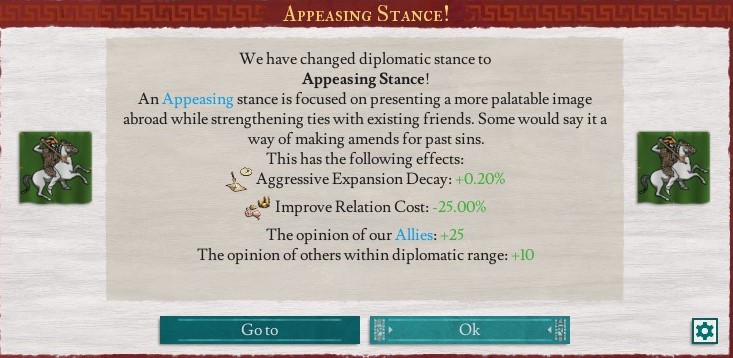 It was a shock on Yonu’s return to discover that instead of going to Alexandria and meeting with the Basileus’ family, Yonu had instead journeyed to the fringes of Egypt - to a small town on the border with the Seleucid Kingdom - and there offered a peasant babe myrrh ‘for his deathshroud’. The child appeared of no great importance, being born in a rude barn, with all the inns in town being used instead to garrison frontier troops. Nevertheless, Yonu’s exaltation of him reached the ears of the local governor, whose attempts to order the execution of the child were only prevented by the entire family fleeing north over the border. The experience appeared to harden the family against the Egyptians - the child’s cousin would, in later years, be beheaded for preaching against and condemning the ‘incestous union’ of the Ptolemies.  Yonu, meanwhile, returned to Scythia a changed man. Arriving off the boat at the same time as the passing of Gayaka, the brief successor to King Cakule, he appeared as a ill-omen amongst the chiefs, who in terror named him King. While he spurned the crown, claiming that he wished to be a 'servant in the kingdom to come' rather than a ‘king of the world’, he agreed to shoulder the burden of rulership, that ‘the path for the king may be made straight'. In order that a suitable crown ‘for the future king’ be forged, the old gold mines at Thasos were immediately re-opened.  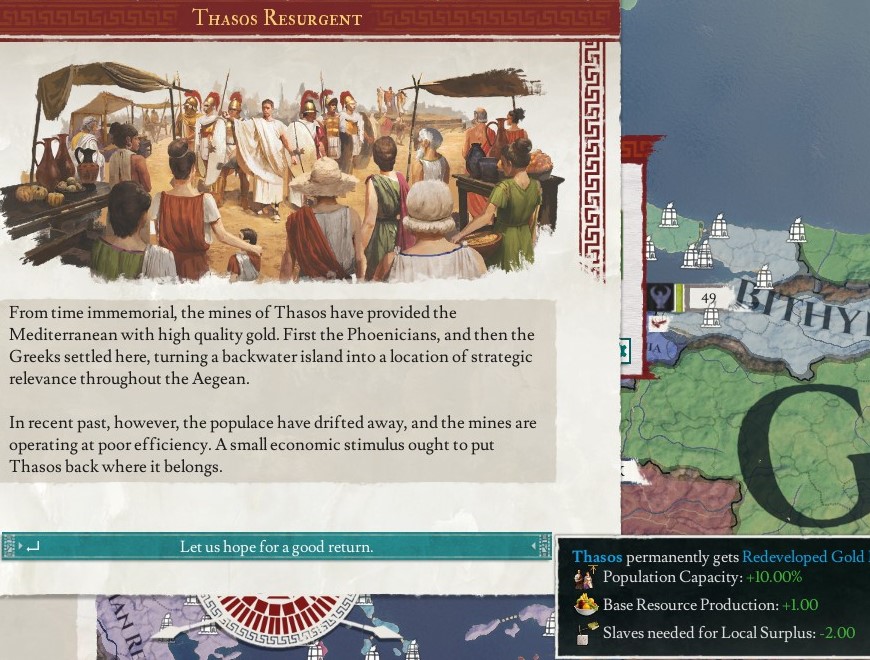 His style of rulership significantly differed from previous kings. In him, the slaves found one who was bizarrely sympathetic to their ‘plight’. Slaves were freed from bondage, and one particularly notorious quarry owner found himself penniless after Yonu seized all his property, claiming that the owner had not made the stone himself, but it had instead been ‘made for all’.   This action was drastic enough for the chiefs to call a council to declare Yonu ‘a madman, bereft of reason’, sparking a crisis between the chiefs on one side and Yonu on another. While much of what was said and promised is unknown, Yonu did comment afterwards that the chiefs could have ‘all the gold and jewels of this world, should they let me fulfill my duty’. At the chief’s behest, he plundered Macedon, seizing Pella, the jewel of Hellas, in the process. 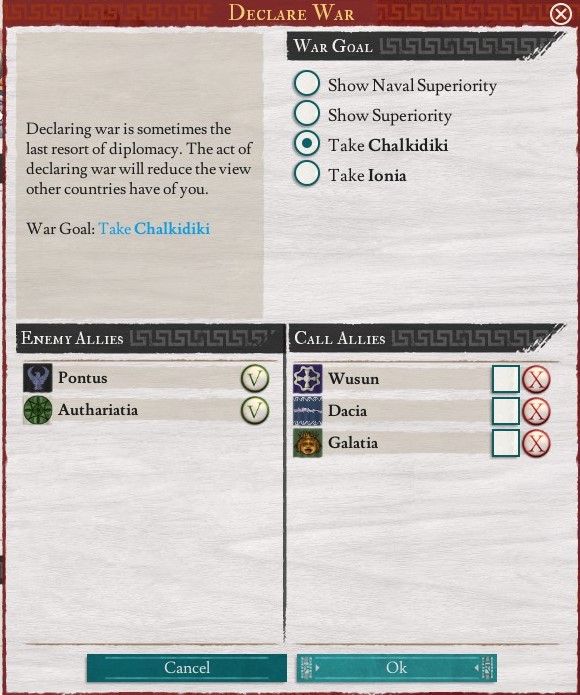   His relations with the chiefs further improved when he directly intervened in the care of Skware, who was suffering greatly from the the red plague. Whereas others feared to be around him from fear of infection, Yonu entered into his sick-tent, spoke of a great and terrible name over him, and exited. Not only did Yonu not contract the illness, but Skware began to recover from his illness soon after, though he still bore the marks of a less successful earlier treatment. 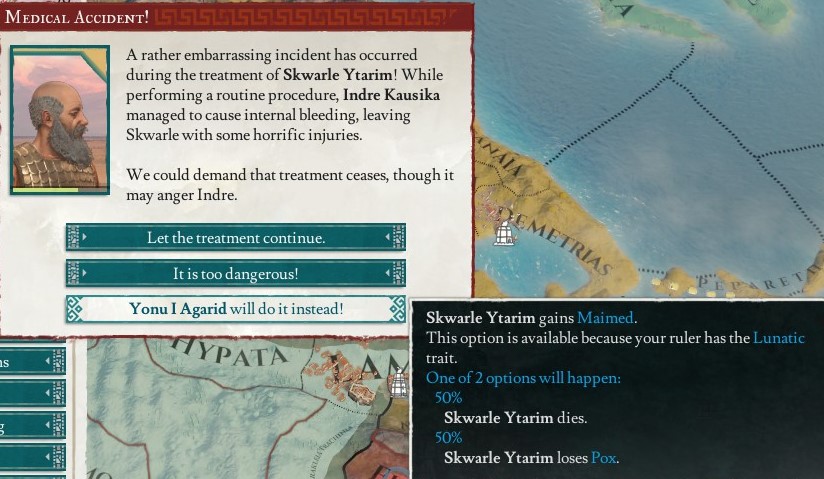 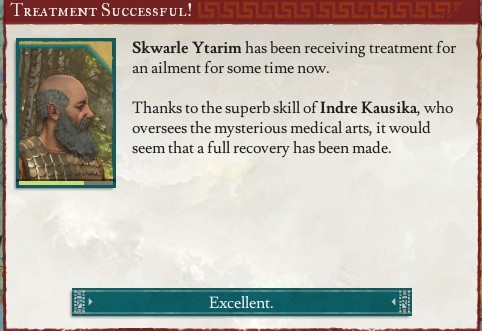 With relations between the chiefs and Yonu mended - or at least tolerable - some of the petty nobility and other tribal chiefs began to attempt to emulate Yonu’s eccentricities. At the newly conquered palace of the Argaeds, the home of Alexander and Phillip, Jnana hosted sacrifices ‘in the name of the new Alexander’, though he was careful to avoid clarifying whether that was the Carthaginian Suffete, Yonu, or Yonu’s peasant-king. Katch, the Chief of Wusun, was noted to have traveled down to Pella for the occasion. Indeed, it was by attempting to ask Yonu what sacrifices would be most pleasing to the heavens that Katch precipitated the second crisis of conflict in Yonu’s reign - Yonu announced, matter of factly, that only the sacrifice of the ‘pure man and clean king’ would bring justice and peace.  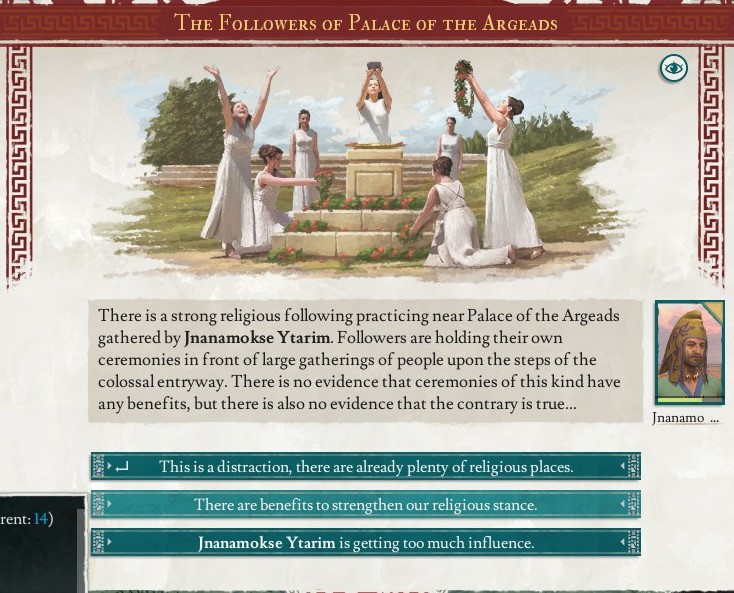 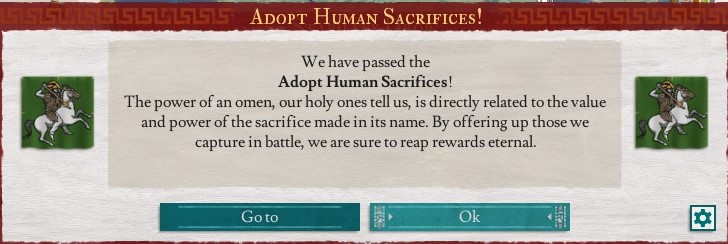 The year is 20AD and Scythia trembles under the rule of a madman. 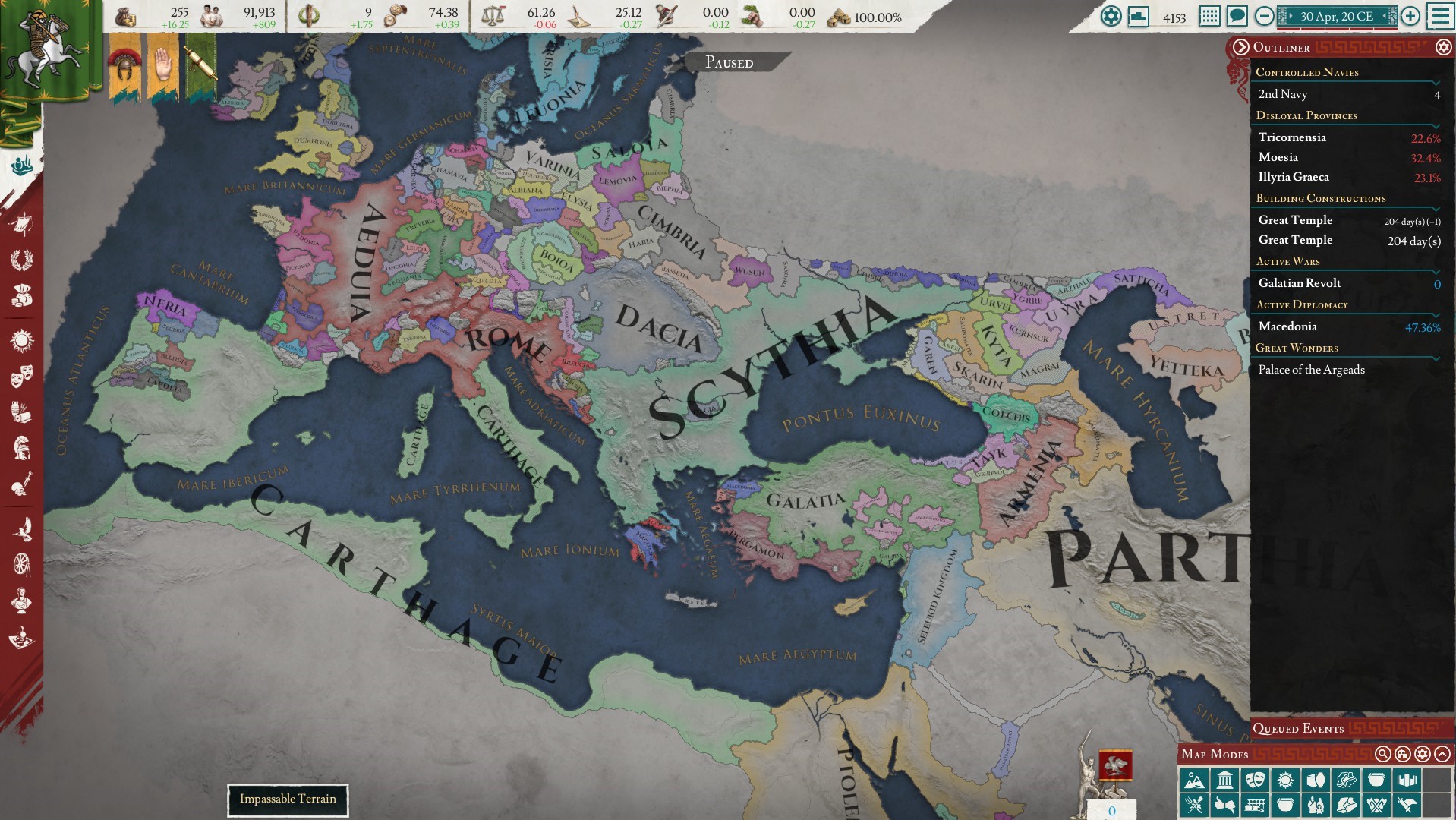 OOC: turns out the Romans have a nasty heritage (think national ideas in EU4) that lowers the threshold for civil war. I assume they’re meant to fix it by going down their mission tree, which they’re now pretty much locked out of. Honestly, means that history will be pretty different so I’m planning on not fixing it - the Gauls and the Punics can tag-team the eagle’s decaying corpse as much as they want. Question for the chiefs: What should we do with Pella? It's a very, very nice city. Options include (and these can be all done/combined) Burning it down - self-explanatory Consecrate it to our Gods - will make the effect of that god's omen more powerful. I'd probably consecrate in to Tabiti, our source of all life/flame imperishable god. Yonu won't do this, but as it can't be done until Pella has a plurality of our religion that's not a issue anyway. If Pella converts to Christianity before this can be done it's also unlikely to happen - Christians spread like wildfire. Of course, that wouldn't be a problem if Christianity was our state religion... Make it our capital! Self explanatory, will result in a even high population for it. Can't be done until we have a plurality of Scythians in the city. 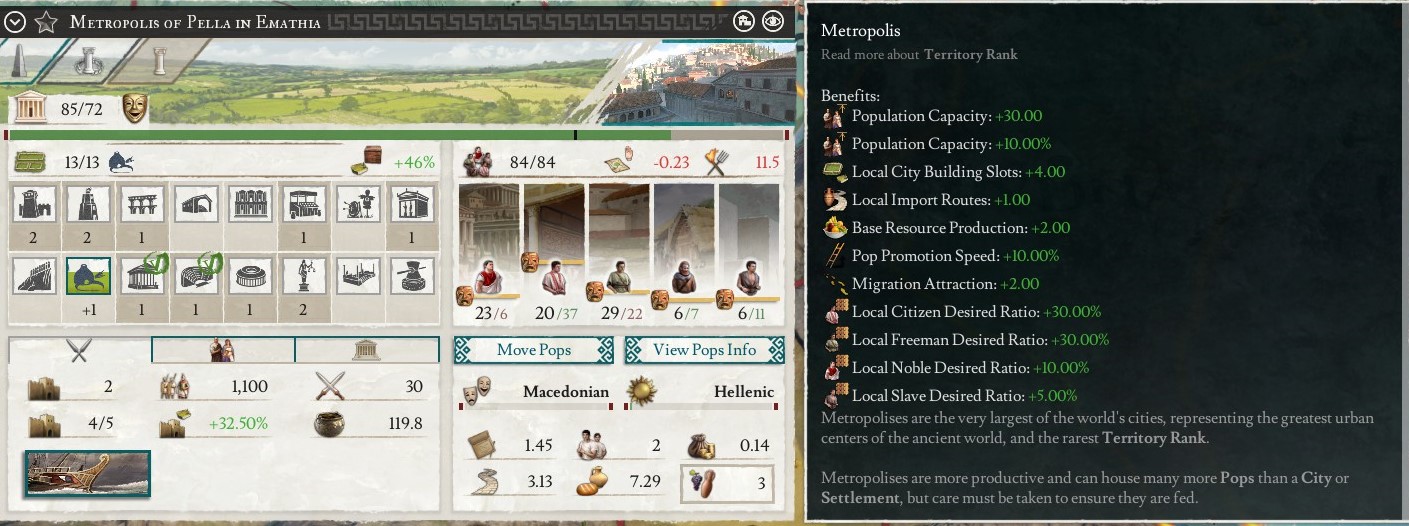 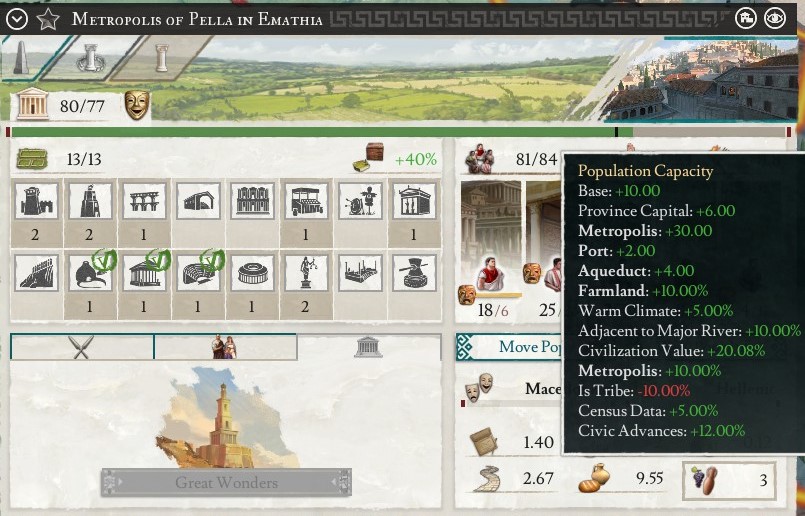
Yuiiut fucked around with this message at 08:23 on Sep 8, 2022 |
|
|
|
Consecration sounds like the way to go to me.
|
|
|
|
Consecrate without heed of consequence.
|
|
|
|
Make it our capital!
|
|
|
|
Consecrate!
|
|
|
|
Capital!
|
|
|
|
Ah, yes, my favorite video game, Imperator: Carthage. Anyway that's a nice city, we should make it our capital.
|
|
|
|
Consecrate!
|
|
|
|

|
| # ? May 3, 2024 23:51 |
|
Consecrate it!
|
|
|






























